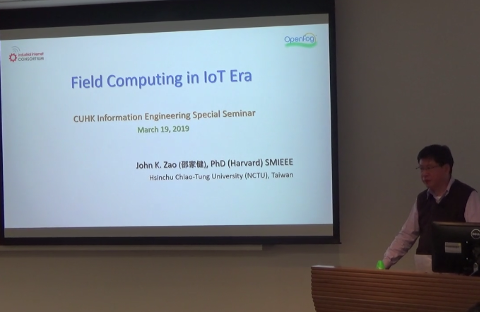
A new term “Field Computing” was coined recently to encompass pervasive information management, processing and utilization along the “Things-to-Cloud Continuum” over the Internet. Mist, Edge and Fog Computing will occupy different tiers in this new paradigm; cutting-edge Telecom and Datacom networks will lay down its information fabrics; emerging applications such as intelligent transportation, smart factories, smart cities, precision farming, etc. will be built upon its infrastructure.
A scalable, interoperable and composable framework architecture for Field Computing is currently being developed among industrial consortia and standard development organizations. This talk will begin with an introduction to this emerging architecture. It will then highlight the necessary research, development and education efforts to realize this new computing paradigm and promote its applications. Before concluding his talk, the speaker will provide a summary of the technology and testbed development projects he is involving in NCTU and CUHK. Hope this will serve as a call for further collaboration.
Dr. John K. Zao is a leader in Fog Computing. Currently, he is the Director of the Fog Computing Alliance Research Center in the Hsinchu Chiao-Tung University (NCTU) in Taiwan, the Chairman of the IEEE Standard Working Group on Fog Computing and Networking Architecture Framework, and the Vice Chairman of the IEEE Standard Committee on Edge/Fog/Cloud Communications with IoT and Big Data. He is also the Co-chairman of the Security Working Group of OpenFog Consortium. After the completion of the combination of OpenFog Consortium (OFC) and Industrial Internet Consortium (IIC), Dr. Zao will become the Co-chairman of the Fog Computing Task Group and the Security Working Group as well as the IIC Liaison with IEEE 1934 & 1935 projects and Global Platform standard development organization.
Dr. Zao received his PhD in Computer Science from Harvard University in 1995. Before returning to Asia, he served as a Senior Member of Technical Staff (1994–1999) and then a Principal Member of Technical Staff (1999–2002) in the Information Security Department of Internet pioneer, BBN Technologies. He was a member of the IP Security Protocol development team, and the principal investigator of four DARPA projects: Security Architecture for Global Mobile IP Support, Policy Based Security Management, Policy Management for Defense Information Assurance Networks and Formal Information Assurance System Modeling. After returning to Asia, Dr. Zao focused his work on the application of Pervasive Computing and Internet of Things on eHealth and Smart Living. With support from Taiwan Ministry of Science and Technology, he developed a ubiquitous sensor/actuator infrastructure for Adaptive Assistive Living, a mobile platform for Pervasive Telemonitoring, and heterogeneous H.264-SVC multicasting schemes using UEP fountain codes.
Dr. Zao is an outstanding teacher and a strong advocate for makers training. He received a Distinguished Teaching Award from Hsinchu Chiao-Tung University in 2006 and an Outstanding Remote Educator Award from Shanghai Jiao-Tong University in 2011. His on-line Internet Security course was multicast to more than 3,000 students in China in its first semester. His hands-on course “Pervasive Computing, An Entrepreneurial Approach” produced the world champion in Vision 2020 at the Microsoft Imagine Cup 2010. Currently, he is developing a series of maker courses on the DevOps approach to Micro-Service provisioning for senior students and software professionals in order to prepare them for the next paradigm shift in the IT industry.
Dr. Zao is also an entrepreneur. Before pursuing his doctoral study, he was a founding partner of SecurKey Systems in Weston, Ontario where he led the development of data encryption modems for EDI transactions. In 2015 and 2016, he co-founded two startups, CerebraTek in Hsinchu and NGoggle in San Diego, with his colleagues in NCTU and UCSD. Together, these two companies developed an objective Glaucoma diagnosis technique based on multi-focal steady-state visual evoke potentials (mf-SSVEP) emitted from human V1 visual cortex. They just received a US-NIH STTR Phase II grant of $1.5M and signed an agreement with Heidelberg Engineering in Germany to develop new ophthalmic instruments based on this technique.
